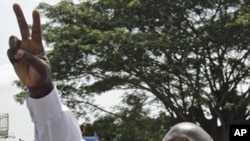Ivory Coast's opposition candidate is calling on his supporters to ignore an overnight curfew ahead of Sunday's presidential election after three people were killed during clashes between police and opposition supporters.
Supporters of former prime minister Alassane Ouattara clashed with riot police in the capital's northern Abobo district. Witnesses say the deaths and several injuries took place before soldiers moved in to restore order.
Mr. Ouattara is calling on his supporters to disobey an overnight curfew imposed by President Laurent Gbagbo because Mr. Ouattara says it is unconstitutional and will allow authorities to engage in electoral fraud.
The curfew is in effect from 10 pm to 6 am Saturday and Sunday then from 7 pm to 6 am Monday through Wednesday. It does not apply to electoral officials, journalists, campaign staff, or election observers.
President Gbagbo says the curfew is meant to maintain order during this long-delayed vote and will not affect the transparency of the poll.
The two candidates failed to resolve their differences over the curfew in three hours of talks with regional mediator Burkina Faso President Blaise Compaore. But they did issue a joint statement calling for calm. Prime Minister Guillaume Soro read the statement.
The candidates asked their supporters to refrain from acts of aggression against people, property and electoral equipment so Sunday's vote can be organized in the peaceful climate necessary for transparent elections. Both men say they are solemnly committed to respecting the outcome of the poll. They called on Ivorians to turn out massively for the vote, to vote calmly, and to wait for the results serenely.
President Compaore says he is confident about the vote.
President Compaore says it is an important vote for the maturity of Ivorian democracy and for all of West Africa. He called on voters to give a good example of how African elections are organized.
The first round of voting was relatively peaceful and election observers generally said it was free and fair. Mr. Gbagbo won 38 percent of the vote. Mr. Ouattara won 32 percent. This second-round runoff depends largely on who can win over the 25 percent of voters who backed the third-place finisher, former president Henri Konan Bedie.
Ivory Coast's President Imposes Election Curfew




